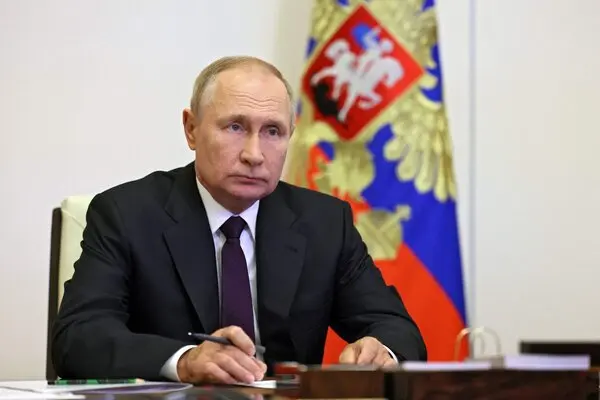Russian President Vladimir Putin’s recent criticisms of Europe for alleged “Russophobia” and accusations against the Baltic States for human rights abuses have further heightened tensions between Russia and Western nations. The remarks were made during the inauguration of a World War II memorial, where Putin consistently drew parallels between Russia’s current situation and the struggle against the Nazis.
In his speech, Putin targeted Ukraine, accusing the regime in Kyiv of exalting Hitler’s accomplices, particularly the SS men. He claimed that Russophobia is being promoted as state policy in some European countries. These comments come in the context of Russia’s deployment of troops into Ukraine nearly two years ago, with Putin using historical references to unify the Russian nation behind its actions.
“The Germans’ aims then were to steal the Soviet Union’s resources and eliminate its people,” Putin asserted during the commemoration of the 80th anniversary of the conclusion of the Nazi siege in the Leningrad region. Ukraine, having suffered significant devastation from Hitler’s forces during World War II, rejects these comparisons and views them as unfounded pretexts for Russia’s aggression.
Putin’s criticism extended to the Baltic States – Estonia, Latvia, and Lithuania – which were once part of the Soviet Union and are now part of the European Union and NATO. The Baltic States have been vocal critics of Russia’s invasion of Ukraine, and Moscow has accused them of xenophobia and mistreatment of Russian minorities.
“In the Baltic states, tens of thousands of people are declared subhuman, deprived of their most basic rights, and subjected to persecution,” Putin claimed, referring to migration crackdowns in the region.
These statements have added fuel to the already strained relations between Russia and Western nations. The ongoing conflict in Ukraine, accusations of interference in other countries’ affairs, and human rights concerns have contributed to a deteriorating geopolitical environment.
Putin’s use of historical references, particularly the comparison to the struggle against the Nazis, serves as a narrative to justify Russia’s actions, both domestically and internationally. By portraying Russia as a victim of Russophobia and drawing parallels with historical enemies, Putin seeks to rally domestic support and present his government as a defender of national interests.
The accusations against the Baltic States are part of a broader pattern where Russia portrays itself as a protector of Russian minorities abroad. This narrative aligns with Moscow’s geopolitical strategy, justifying interventions or actions in neighboring countries by claiming to safeguard the rights of Russian-speaking populations. The Baltic States, being part of NATO and the European Union, have been at odds with Russia over its actions in the region.
The international community, particularly Western nations, has often criticized Russia for its human rights record, including issues related to freedom of speech, political opposition, and treatment of minorities. Putin’s counter-accusations against European countries and the Baltic States are seen as attempts to deflect attention from internal challenges and portray Russia as a victim rather than an aggressor.
As tensions persist, the comments made by Putin are likely to further strain diplomatic relations and complicate efforts to find peaceful solutions to ongoing conflicts. The use of historical narratives and accusations of Russophobia contribute to a narrative that justifies Russia’s actions in the eyes of its domestic audience but widens the gap between Russia and the international community.
In this geopolitical landscape, finding common ground and fostering dialogue becomes increasingly challenging. The consequences of these tensions extend beyond regional conflicts, affecting global stability and cooperation. As leaders navigate these complex dynamics, efforts to de-escalate conflicts and promote understanding will be crucial in preventing further deterioration of international relations.














